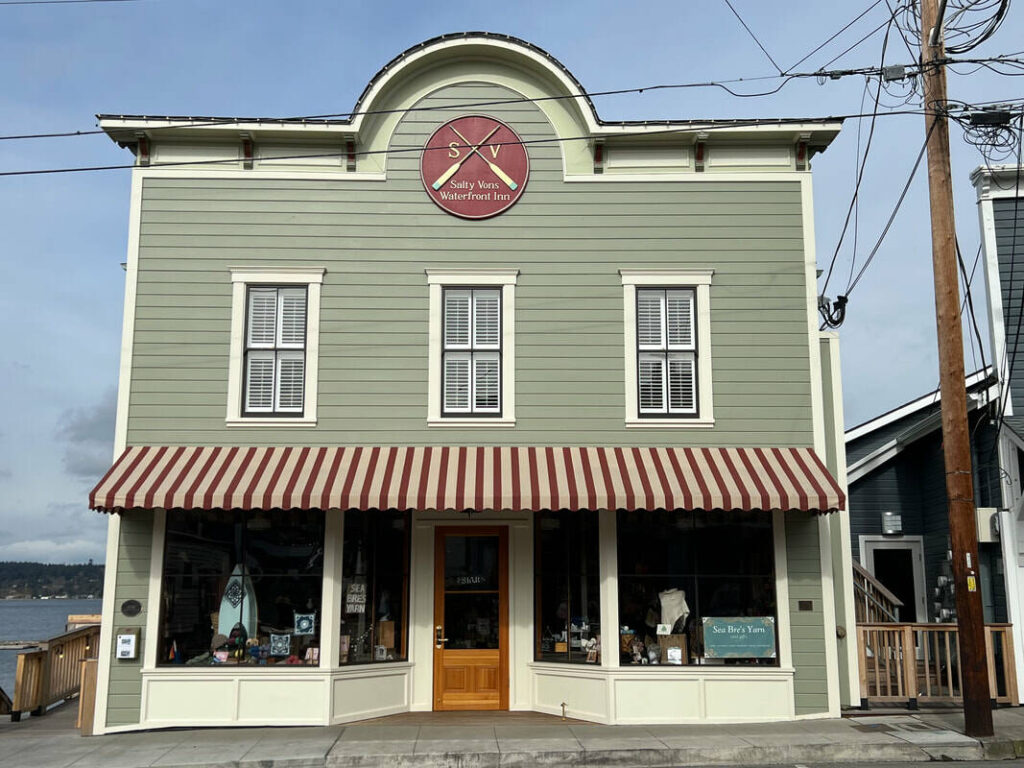Coupeville City Council may consider a proposed law change to allow short-term rentals on the streets in the town’s historic/limited commercial districts, if possible.
On Tuesday night, Barbara Summers and Von Summers, owners of Salty Von’s Waterfront Inn, asked the council to approve a policy change that would allow them to host guests on the main floor of the mixed-use development they own at 12 Front Street NW.
According to town rules, the district covers the area of Front Street between Coveland Avenue and Ninth Street north, Alexander Street and Haller Street, including Coupeville Pier.
According to the Shoreline Master Program, short-term rentals west of North Main Street are permitted in mixed-use developments within the district, but they cannot occupy ground floors.
Additionally, the Shoreline Master Program provides that the ground floor “shall be available to the public and shall continue to be reserved for retail sales and services, professional offices, restaurants, personal services, and marine-related sales and services as permitted by the underlying zoning.”
The inn has three vacation units and is located in the same building that was built in 1886. If the Summers’ requests are met, they will be allowed to use an additional unit behind Sea Breeze Yarn, which is an ADA-accessible office loft and studio with a private suite and king-size bed, according to information listed in the agenda packet.
The Summers said the property will be the only ADA-accessible rental in the district, but Mayor Molly Hughes and City Planning Director Joshua Engelbrecht said there are several properties outside the district that offer Penn Cove views and handicap amenities.
Coupeville is the second oldest town in Washington and the only town in the state located on a National Historic Reserve, so preserving its historic character is important, and that goal has shaped the town’s rules today, the mayor said.
Historically, people lived above ground-floor stores, Engelbrecht said in an interview.
Barbara Summers said the building on the north side of Front Street has two fronts, one facing the road and the other facing Penn Cove.
The Shoreline Master Program states that “transient lodging facilities located west of North Main Street shall not occupy any portion of the first floor (ground level) of any building.”
She said the proposed changes would allow short-term vacation rentals on the main floor side facing Penn Cove while keeping the same rules for the half facing the street.
The Summers wrote that the Historic Limited Commercial District focuses on the street frontage but “fails to recognize that properties on the south side of Front Street also front onto Penn Cove.”
The buildings on Front Street are old and in need of repairs, Barbara Summers said. To maintain these properties, landlords have to charge higher rents. Short-term rentals in scenic locations can attract tourists year-round, helping to revitalize the downtown economy and preserve historic properties, Barbara and Von Summers said.
In their presentation, the Summers wrote that the storefront behind Sea Bree’s Yarn is not a good location for retail because it is not visible to passersby on Front Street.
“We’re looking at how to make the most of the existing building,” Barbara Summers told council.
The Summers initially tried to avoid a request to change the rules by interpreting the space’s use as a club that would host living room concerts and movie nights, but they said the town didn’t interpret it that way.
Meg Olson, owner of Kingfisher Bookstore at 16 NW Front St., said retail, dining and service businesses draw local residents and tourists to downtown. These places are “as close to public space as you can get to truly have public space,” she said, and she worries short-term rentals would deny those businesses the opportunity to open, expand and continue to exist as community hubs.
Public Works Director Joe Grogan said finding parking on Front Street has been difficult, and an increase in vacation rentals could compound the problem.
The City Council will not decide whether to move forward with this policy change until Engelbrecht has a better understanding of what the process entails and how it will affect other businesses to avoid any unintended consequences. With the intermediate housing code amendments, Coastal Adaptation Strategy and Comprehensive Plan updates underway, Councilmembers Michael Moore and Jenny Bright said they may prioritize these over the zoning change.
Hughes said he has received calls from people who are opposed to the plan, as well as from people who may be interested in opening vacation rentals on the street, and there will be an opportunity for community involvement once more information is available to further discuss the proposal.




